Mahesh Kulkarni in Chennai/Bengaluru
The political instability and poor governance in the state has dealt a blow to brand Bengaluru and has affected it as an investment destination. The state has been rocked by scandals, corruption charges and land scams involving no less than its chief minister B S Yeddyurappa.
Though the ruling Bharatiya Janata Party (BJP) rode to power for the first time in the state and south India after the 2008 legislative assembly elections on development plank, with high hopes and promises galore, stability has been eluding the state, as Yeddyurappa had been battling to ensure his government's continuation due to lack of clear majority.
In the 225-member assembly, the BJP secured only 110 seats, three short of the half-way majority (113), forcing it to seek the support of five independents to survive the first floor test in June 2008.
Being wary of its slender majority, the ruling party spent most of its time and resources in ensuring the survival of its government by launching 'Operation Lotus' to wean away legislators from rival parties and make them to contest on its ticket for a clear majority.
. . .
Political instability dents Brand Bengaluru
Image: An IT park in Bengaluru.Photographs: Reuters
Lack of experience in administration and rampant factionalism in the party have been a bane of the 31-month-old government, leaving little time for Yeddyurappa to focus on socio-economic development and infrastructure growth.
Like many other states, the global recession and slow down in the Indian economy had a cascading effect on the state's gross domestic product (SGDP) and tax collections, as manufacturing and services sectors suffered for want of business and fresh investments.
The SGDP grew by 5.5 per cent to Rs 189,773 crore (Rs 1,897.73 billion) for the year 2009-10, as against Rs 179,809 crore (Rs 1,798.09 billion).
The state's tax revenues were up by 6 per cent at Rs 29,339 crore (Rs 293.39 billion) compared to the previous year. However, they were down by 10 per cent compared to the budget estimates of Rs 32,721 crore (Rs 327.21 billion) for the year.
. . .
Political instability dents Brand Bengaluru
Image: Employees at an IT office in Bengaluru.Photographs: Reuters
However, the state, which is still holding on to its numero uno status in the IT exports showed a dismal growth in the year 2009-10, by exporting Rs 76,000 crore (Rs 760 billion) worth of software, a mere 1.5 per cent growth over the previous year.
Ironically, the state and its capital Bengaluru, which earned the sobriquet of being India's tech hub, are in the news at the national and international levels for all the wrong reasons due to leadership crisis bedevilling the government, with Yeddyurappa becoming a target of the opposition as well as detractors in the ruling party.
The land scams involving Yeddyurappa's family, including his younger son B Y Raghavendra, a Lok Sabha member from Shimoga, coming a month after the fledgling government survived two trust-votes following a revolt by 11 rebel legislators and the five independents further fuelled fears of instability continuing to derail governance and development.
A cross section of the industry in the state views the political crisis as more damaging to the economy and growth, driving away prospective investors to other states.
. . .
Political instability dents Brand Bengaluru
Image: Karnataka Chief Minister B S Yeddyurappa.Photographs: Reuters
"The crisis-ridden rule of the BJP government in the state has dented the brand image of Bengaluru as a preferred destination of investors and entrepreneurs. As a result, investment flow has trickled compared to what it was during the Congress regime (1999-2004)," K-Two Technologies managing director Ananth Koppar lamented.
Over the last decade, though Bengaluru emerged as the country's tech hub, political instability and lack of infrastructure development, especially power, roads and red-tapism have relegated the state behind the neighbouring states of Andhra Pradesh and Tamil Nadu.
"The BJP government showed many promises initially with assurances of investor-friendly policies but lacked determination and political commitment to implement them as it was bogged down in the survival game," Koppar said.
In a bid to revive growth prospects following signs of recovery, the beleaguered government held a mammoth Global Investors Meet (GIM) in June and attracted investment proposals worth Rs 4 lakh crore (Rs 4 trillion) from diverse sectors, including steel, cement, energy and IT and BT.
. . .
Political instability dents Brand Bengaluru
Image: The new Bengaluru International Airport.Photographs: Courtesy, BIAL
The state government not only promised investors all support facilities, policies and incentives, but also displayed urgency in allotting vast tracts of land and captive mines to global steel majors such as ArcelorMittal and Korean Posco.
"But there is no clarity in the state's investment policies. Though many incentives were flagged at the GIM, they were meant for multinationals and not local companies, as evident from the preferences being given to them in land allotment and quick approvals, while we wait for the same," transport major VRL group chairman Vijay Sankeshwar claimed.
External Affairs Minister S M Krishna, credited with turning Bengaluru into India's Silicon Valley when he was the state's chief minister, regretted that the land scams, nepotism and corruption involving the chief minister and his cabinet colleagues have hurt Karnataka's image the world over.
"In the past, Karnataka was held in high respect both at national and international levels with Brand Bengaluru as India's IT & BT (biotechnology) capital. That fair image has been hit by corruption charges at high levels," IT-savvy Krishna said in an oblique reference to the allotment of prime lands and residential sites by Yeddyurappa to his kith and kin.
. . .
Political instability dents Brand Bengaluru
Image: Traffic congestions have become commonplace in Bengaluru.Photographs: Reuters
Reflecting the concerns of India Inc., Infosys Technologies CEO S Gopalakrishnan said for growth, a stable government and a stable economic environment was a prerequisite.
"Whatever is happening in Karnataka is not good for industry's growth. It is important that we get back to good governance as early as possible," Gopalakrishnan, who is also chairman, CII-southern region, asserted.
Admitting that the current political developments in the state have tarnished the image of Bengaluru, the IT bellwether's honcho said the onus to restore the city's credibility and confidence squarely lied on the state government and political parties.
Noting that industrial growth required a stable government, Bengaluru Chamber of Industry & Commerce (BCIC) vice-president Vinod K Nowal said the ruling party and its government should resolve all issues quickly to restore the confidence of investors and entrepreneurs.
. . .
Political instability dents Brand Bengaluru
Image: An IT company campus in Bengaluru.Photographs: Reuters
On the flip side, a section of the industry feels the image of Bengaluru, as a favourite investment destination is intact in spite of the political crisis gripping the state.
"Bengaluru's image is not tarnished. It's the image of the politicians that is battered. Corporates are coming to the state looking at skilled workforce and its work culture and not by looking at our politicians," said Shekar Viswanathan, deputy managing director, Toyota Kirloskar Motor Ltd and president of BCIC.
Harish Bijoor, CEO, Harish Bijoor Consults said, "Fortunately, Bengaluru has a positive brand value. However, the political instability causes slur. The present political developments in the state have definitely dented the image of Bengaluru."
He, however, feels that there would be no negative impact on the investments coming into the state. The city of Bengaluru, being the knowledge capital, should increasingly make use of technology in all areas of public life, so that greater transparency can be brought into governance.
. . .
Political instability dents Brand Bengaluru
Image: Employees at an IT firm.Photographs: Reuters
Also, he thinks that more and more private sector people should enter politics, so that the system can be cleaned up.
Endorsing the majority view, Federation of Karnataka Chambers of Commerce & Industry (FKCCI) former president R C Purohit said the sordid developments in the ruling party and the government had certainly cast a shadow on investors' confidence.
"Decision to invest in the state will not be easy. More than the land scams coming in the way of investments, it is the infrastructure bottlenecks that will keep away investors from the city and state. If only the infrastructure is improved, people and investors in general will forget everything," Purohit pointed out.


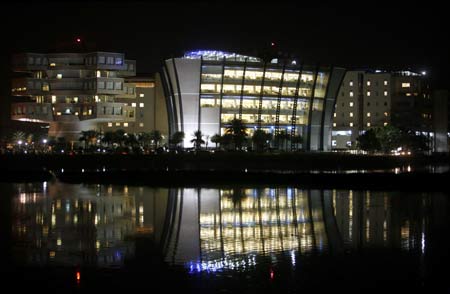
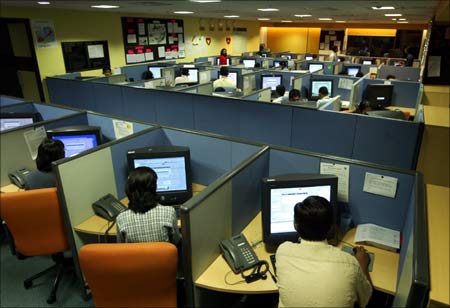
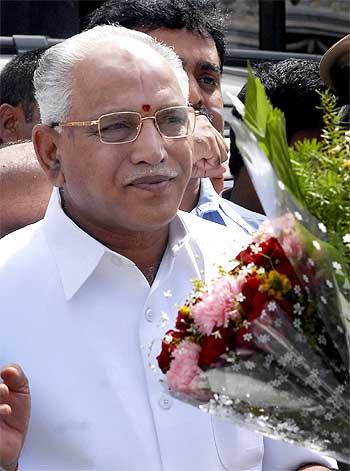
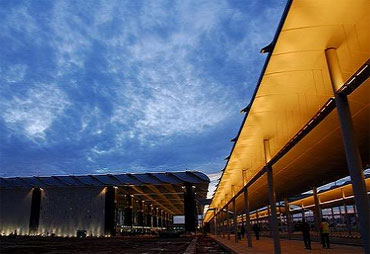
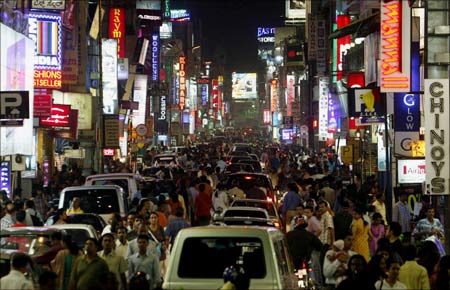
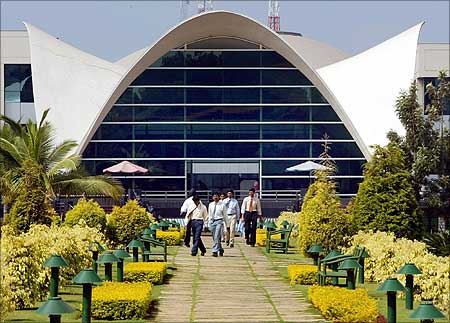
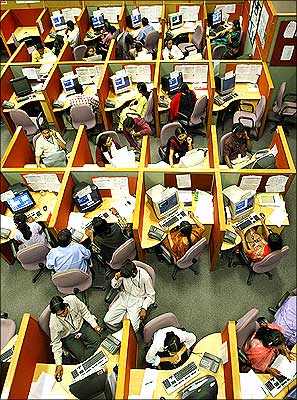

article